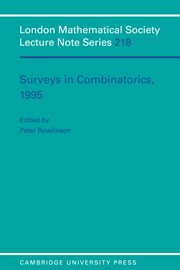Book contents
- Frontmatter
- Contents
- Preface
- Euclidean geometry of distance regular graphs
- Large sets of Steiner triples
- Searching with lies
- Spin models for link invariants
- Computational Pólya theory
- Mixing of random walks and other diffusions on a graph
- Cayley graphs: eigenvalues, expanders and random walks
- Construction and classification of combinatorial designs
- Modern probabilistic methods in combinatorics
Searching with lies
Published online by Cambridge University Press: 05 May 2010
- Frontmatter
- Contents
- Preface
- Euclidean geometry of distance regular graphs
- Large sets of Steiner triples
- Searching with lies
- Spin models for link invariants
- Computational Pólya theory
- Mixing of random walks and other diffusions on a graph
- Cayley graphs: eigenvalues, expanders and random walks
- Construction and classification of combinatorial designs
- Modern probabilistic methods in combinatorics
Summary
INTRODUCTION
Consider a game of Twenty Questions in which someone thinks of a number between one and one million. A second person is allowed to ask questions to each of which the first person is supposed to answer only yes or no. Since one million is just less than 220, it is clear that a “halving” strategy (i.e. asking “Is the number in the first half million?”, and so on) will determine the number within twenty questions. But now suppose that up to some given number e of the answers may be lies. How many questions does one now need to get the right answer?
This is Ulam's searching problem, posed by Stanislaw Ulam (1976) in his autobiography “The Adventures of a Mathematician”.
The problem has recently been solved for all values of e (for the cases of both 220 and 106 objects). We give the solution in Figure 1 and an outline of the proof in Section 3.
More generally, we may consider the problem of finding the smallest number f(M,e) of yes-no questions sufficient to determine one of M objects if up to e of the answers may be lies. In Section 4, we survey the present state of knowledge regarding this function.
In Section 5, we consider a version of Ulam's problem without feedback, where all the questions must be asked in advance of receiving any answers. This is equivalent to a problem in the theory of error-correcting codes.
- Type
- Chapter
- Information
- Surveys in Combinatorics, 1995 , pp. 41 - 70Publisher: Cambridge University PressPrint publication year: 1995
- 8
- Cited by

